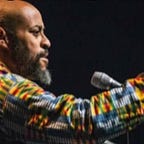Allyship in 2018: Towards Race-based Community-centered Healing Spaces
This article concludes a three-part interview series exploring how allyship is cultivated. Justin Zagorski is the Social Justice Program Manager for Anchorage, Alaska’s YWCA. He experiments with inter-group dialogues designed to raise awareness of implicit and explicit biases. The challenge is inspiring average persons to acknowledge the innate power they have to engage in social justice.
Who are attending the community-based conversations you facilitate?
JK: The dialogues are strategically scheduled during the work day, which I know limits who can show up. A large number of people who are most negatively affected by intersecting dynamics of oppression do not have salary jobs that allow them to take a long lunch to have this dialogue.
Currently, the dialogue are intended to bring in people from local organizations and businesses. Our hope is that they will find value in the process and bring it back to their team. We facilitate these dialogues in workplaces as well. Inclusion assessments are a part of that process. In terms of our workplace inclusion services, we are mostly working with other non-profits right now, but we are in conversation with city services and the for-profit sector.
People coming to the public dialogues usually bring with them a fair amount of awareness. I believe they leave with a deeper understanding or a new skills, but we aren’t engaging folks who have little-to-no awareness. For instance, our next dialogue is about colorblindness and I wonder how many of our attendees would say, “I don’t see color?”
At this point, my hope is that these educated folks take what they learned back to their circles. Occasionally, somebody says that “we are preaching to the choir,” but I think of it more like a ripple effect. Even if we are a choir, can we learn a new song, that we can then teach to others. I hope the dialogues lead to a larger ripple in Anchorage. We contribute to a movement that started long before us anyways.
That brings me to the last thing I’ll say to this question. I believe there are many organizations and people doing anti-racism work, but not everyone knows about it. First Alaskans launched a Truth, Racial Healing and Transformation process. I’ve heard interviews where Liz Medicine-Crow, President of First Alaskans Institute, using anti-racism and healing to describe their efforts. So, I think people are in Alaska that are having a conversation for which we are still trying to join. Initially we discussed the possibility of calling the Diversity and Inclusion services “Anti-Racism” Dialogues, but we decided against it in an attempt to make the services more approachable. So, I wouldn’t say we are leading a movement but we are trying to make a meaningful contribution.
Who do you want to have the conversation that is not having the conversation?
I have two responses to this. First, I wish the people who cannot easily have this conversation would have this conversation! We could work through so many city issues, if there was some way to have a city-wide intergroup dialogue effort every person could participate in. I’m not even sure what that would look like. I often ask participants if they see Anchorage as integrated or segregated? We can easily just at the demographic identities represented in our schools to see segregation. I also ask them as it pertains to our social circles.
Who hangs out with who after work? Who gets called in for interviews when there is an open position and we are told to reach out to our networks?
I wish for every person to have dialogue across racial lines and to develop meaningful cross-racial relationships. I know there is always the opportunity for this to occur on its own. But, if other white folks are like me — we don’t often seize the opportunity — and, I think we all know why this burden shouldn’t be on people of color.
I just wish more people realized what we the greater American society are missing out on progress by this not occurring. I should say, I see some white folks who are role modeling this process, and are very effective at building bridges. I’m still learning how.
The second group would be more White folks. Specifically, I am personally interested in facilitating spaces for White folks to talk about race among other White folks. I don’t mean in a white nationalism kind of way; I am speaking more to the process of healing from internalized whiteness.
I attempted to create the space for our Stand Against Racism this past April, but there was pushback. I’m hoping a refined attempt will be more embraced in 2019. The point of this space is because I want more White folks to being having “the conversation” on their own. I always wonder if White people actually leave the dialogues and talk to a close White friend about what they learned, after I have encouraged them too.
In last week’s dialogue I suggested people watch “The Hate U Give.” I wonder if anybody did? I hope to facilitate as much of that process as I can. As more and more White people talk about racism with other White people, racism will start being seen as problem that affects everyone and not just people color. It would be much more unlikely for a person to say, “I don’t see color,” if they felt personally affected by racism, as well as benefiting from white privilege. That would hopefully lead to everyone, more white people, being involved in active ways to eliminate racism.
To schedule Justin Zagorski to facilitate a dialogue in your workplace, please email him at: jzagorski@ywcaak.org
